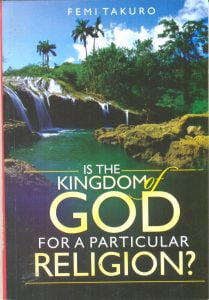
Whatever form religious intolerance manifests itself, it leaves bitter, painful taste in the mouth. This, no doubt, makes Pastor Femi Takuro’s book timely and instructive.
It is titled “Is the Kingdom of God for a particular religion?”
Takuro’s undertaking to write this book undoubtedly shows his commitment to not only interrogate the burning issue of religious extremism, but significantly, it underscores the fact that no religion – ancient or modern – encourages the killing of human beings for whatever reason, but promotes peace.
In this book, Takuro examines the concept and doctrines of the various religions, their doctrinal similarities, and striking differences.
The 66-page book, divided into 13 chapters, references and profile, is a much-needed intervention against the backdrop of increasing cases of religious extremism, intolerance and terrorism.
The introduction, as in Chapter 1, looks at religious intolerance which has led to killings and destruction of monumental proportion that has almost brought governments across the world to their knees.
The author said: “For ages, mankind has been embroiled and enmeshed in innumerable wars and persecution because of self-righteousness, lust for power, unbridled arrogance and religious intolerance.”
“Everyone wants to show that his or her religious belief is superior and should be the accepted norm.”
So, Is the Kingdom of God for a Particular Religion?
The essence of this book, the author notes, is to ascertain whether the propagation of the message of the kingdom of God or the salvation of mankind is the exclusive preserve of a particular religion or sect or for the whole mankind.
And if not, what is the purpose of the prevailing arrogance and intolerance and what actions can be taken, individually and collectively, to ensure and encourage peaceful cohabitation with one another?
In Chapters 2, the author explains the concept of the Kingdom of God, which he notes, is spiritual, the acknowledgement of the sovereignty and ruler ship of the Creator of the Universe – the Almighty God in the lives and affairs of mankind and the belief that it is only those who live in accordance with His divine laws and statutes that will abide with Him eternally. It is neither political nor materialistic but a manifestation of the authority and the power of God in the lives of true believers who will be beneficiaries and inhabitants of God’s kingdom in the end of their earthly sojourn. The author also enumerated qualifications for the kingdom of God, which, he emphasized, is not dependent on the individual’s academic or intellectual achievements or social status.
The qualifications include being truly born again with Christ-like attitude, that is to be honest, humble, forgiving, loving, compassionate and kind, among others; faithful and obedient to God’s word.
True worship, as the author also notes, is beyond ceremonial actions, activities and outward display of piety. “It is all encompassing and must be sincere and genuine from deep reverence for the Almighty God and the creator of human kind. Every Kingdom bound candidate must shun sinful ways. Repentance from sin is not sufficient but total abstinence from sin after repentance is a sine qua non to access the Kingdom of God.”
In Chapter 3, The author examines the essence of the teaching of some major religions of the world, as opposed to their relevance to the Kingdom of God. These religion – Hinduism, Judaism, Buddhism, Christianity and Islam, as well as Shintoism, Confucianism, Taoism, like the predominantly local religions, which are of African origin such as Sango, Ifa, Olokun, Ovia, Amadioha, Gunki, and many others, also believe in the Supreme God, called various names in different languages.
The author focuses in Chapter 4 on the similarities in doctrines.
He looks at the similarities in the various religions, notably concept and name of God; spiritual knowledge of God; morals; peaceful coexistence; Holy book; salvation and afterlife. Regardless of these seeming similarities, there are some striking differences which are often the basis of serious contention among the adherents of the different religions. However, the emphasis here is a focus on the similarities and not the differences.
Takuro notes: “A careful examination and understanding of the fundamental nature and basis of the doctrines of these major religions show that regardless of the different concepts of these religions, the similarities should breed unity, tolerance and love, and there should not be any reason for destruction of properties, lives, maiming and hostility if truly we believe in the same God regardless of the difference.”
He also noted that people should unite for their belief in one God, and that the “choice and responsibility of discerning the right and true path to heaven/paradise is a matter of choice which should not be by force, coercion, terrorism, or threat of annihilation or death but by love and committed show of compassion and encouragement. The final decision rests on an individual.”
Chapters 6 and 7 provide examples of people and entities who embraced peace.
He cited the inspiring story of the ‘bond of unity between David and Jonathan’.
In chapter 8 entitled “Practicing What I Preach, Walking The Talk”, the author relates instances of how he has, in his own little way, demonstrated and shown his determination to embrace peaceful co-existence and religious tolerance.
Chapter 9, “Lessons from Jonah”, relates the story of how Jonah received God’s call to preach repentance to the people of Nineveh, the capital of Assyria, but rather heed the direction of God, Jonah headed for Tarshish which was in Spain, the opposite of his supposed direction. However, the Almighty God had a purpose for the journey and He was determined to ensure that His instruction was carried out by Jonah and make sure that Jonah’s myopic disposition to salvation of fellow human kind changes positively.
The story underscores the expression of the love of the Creator for His creatures, even though they have sinned and rebelled against His laws.
This, Takuro states, is a great lesson for everyone that is fueling religious crisis and intolerance, especially those who believe that the adherents of any other religion apart from their own deserve death.
“The true and only God is concerned for the entire human race and he wants everyone to be saved and delivered. This thereby answers the big question that the kingdom of God is for all the worthy children of God, no matter the religion.”
While Chapter 10 is on the need to keep the able bodies busy, Chapter 11 offers 16 steps to building peaceful cohabitation.
These steps include read and meditate on the word of God; have faith in God; acquire academic qualification or technical skills; be considerate; be genuinely friendly; forgive so as to be forgiven; keep your promises; choose the company you keep; practice honesty and integrity; be humble, among others.
It is refreshing to note that in the midst of these scary situation, there are some good news as reported by ‘Christianity Today’ Direct Newsletter.
This is the focus of Chapter 12, the longest chapter in the book.
The first good news, he notes, was the release of about 230 Assyrian hostages by ISIS early in 2016.
Others include the Morocco Declaration which enjoined Muslim nations to protect Christians from prosecution; the resolution of the age-long conflict between the Church in the western world and that of orthodox Russia on Friday 12th February, 2016.
In the last chapter, the author enjoins us to “fear God and keep His commandment”. From the foregoing, “it is evident that all the religions mentioned in this book affirm the fact that the notion of the kingdom of God is for those who worship and serve God, the Creator of the Universe reverently, sincerely and truthfully. They all enjoin their adherents to show to their fellow human beings, live peacefully with their neighbors, avoid violence, bitterness and rancor.”
Takuro further notes, from the foregoing, that “the recent spate of wanton destruction of lives, properties, division, schisms, threats and sectionalism, all in the guise of propagation of religious belief, cannot be traced to any religion. We are, therefore, encouraged to wake up and realize that all those who are using force and violence in the name of religion are pursuing their own selfish motives and hidden agenda.”
No doubt, this book is a stimulating and fascinating read. The author’s use of references and quotes from the Bible and Quran enlightens the reader and validates his position.

Author: Femi Takuro
Publisher: PRESSWORKS NIG. LTD
Year of Publication: 2017
Pages: 66


